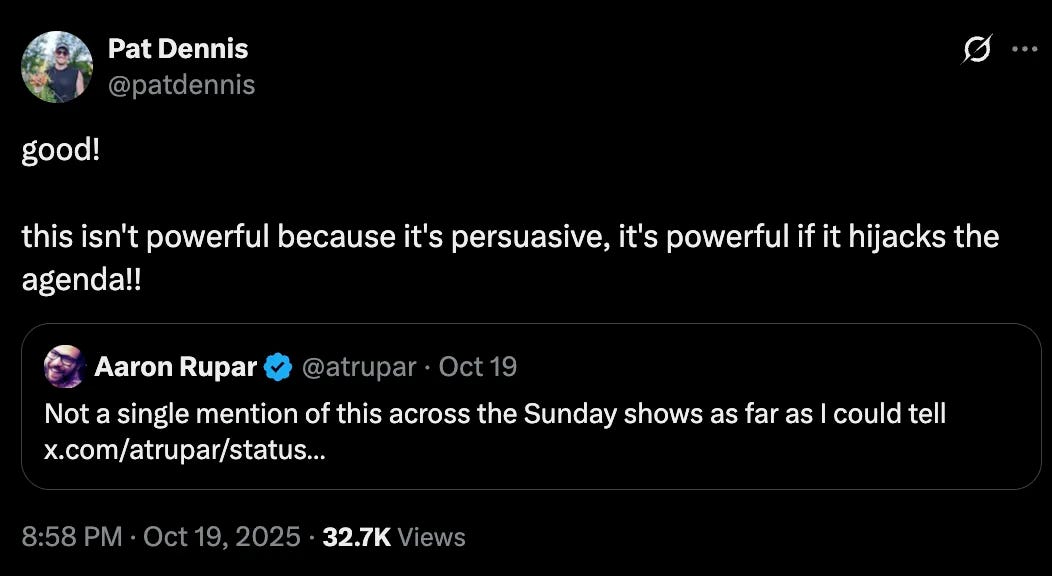Brian Beutler Thinks I Should Encourage Democrats to be More Emotional
Brian Beutler Thinks I Should Encourage Democrats to be More Emotional
He’s wrong.
As I’m sure you’ve seen, Donald Trump posted a ridiculous AI video of himself dumping excrement on No Kings protestors. Many Online Democrats, predictably, responded with outrage. Some of my fellow Democrats, also predictably, attacked the media for not acting as referees and calling Trump out on the issue – including for not centering the Sunday Shows, which are watched by approximately zero persuadable voters, around this vital issue of national importance.
About which I tweeted:
To me, this is one of those lessons that I thought Democrats collectively started to learn around 2018: Donald Trump’s power relates to his ability to disrupt the unofficial rules of Washington D.C,, knowing full well that the consequences for doing so no longer exist. Meanwhile, he creates space for himself to implement extraordinarily unpopular policies. And his power to avoid backlash for those unpopular policies is amplified when we join him on these little extracurricular excursions about other issues.
Brian Beutler, however, disagreed, writing:
Here, by contrast, is the president of American Bridge – a Democratic Super PAC – celebrating the fact that the mainstream media downplayed the A.I. shit-dumping story. He thinks controversies like this won’t persuade many people to oppose Trump, but that if journalists treat it as a scandal, it might crowd out more helpful storylines.
This is how the overwhelming majority of Democratic strategists and consultants think. What Republicans understand that Dems do not is that there’s value in hyperventilating about any story that makes the opposition look bad. If it doesn’t catch on, fine, move along to the next one. “But what if it crowds out the master narrati-” NO, who cares, be angry about everything that’s genuinely infuriating about your opponents. The result will be to create an unpleasant miasma around them that is more powerful than any collection of lab-perfect lines of persuasion.
I’m not losing sleep over the fact that the feces fighter-jet story didn’t make a bigger splash (so to speak) but I do wish Democrats thought harder about how public opinion takes shape—to consider the psychological and social layers, not just the quantitative one. They might realize that it’s usually not by scaling up a message that seems to be persuasive in an intimate or controlled setting.
That last point – that Democrats should think harder about how public opinion takes shape – is vital.
Random social media spats about decorum do not change voters’ minds; they are not even interesting to anyone for whom politics is not already a hobby.
As for the accusation that I am overly concerned with crowding out some master narrative…
The Democratic Party’s brand is disastrously bad. We need to dig out of this deficit, and the only way to do that is to convince voters that it’s possible for Democrats to care about issues that directly matter to voters. This isn’t rocket science, but it requires focus and discipline.
There is, actually, a “master narrative”: it’s the idea that Democrats don’t care about the things that are important to you and your family. We must change this narrative. And until we’ve dug out of that hole, we have exactly zero freedom to flail about emotionally about irrelevant mean videos and attack our opponents over irrelevant issues of decorum. Digging out of that hole means working very hard to be disciplined about what we talk about and with which issues we are associated.
There’s a fallacy, common to first-time Congressional candidates and political hobbyists, that the amount of annoyance you feel at your opponent’s actions is equivalent to the amount of damage your opponent’s actions are doing to your cause. But that’s just not the case. You may feel very annoyed when your opponent tweets that you’re a communist, for example, and just roll your eyes when your opponent says you want to raise income taxes on the middle class – but that second message can be incredibly damaging and requires an immediate response, whereas the first one is merely trying to bait you into engaging and amplifying the issue.
Getting emotion out of the decision-making process is critical to telling the difference, making good choices, and winning elections.
This doesn’t mean we shouldn’t attack our opponents. It means we should attack our opponents on issues where they are weak and where we can be strong. We should attack our opponents on the issues we want to be associated with. We should attack our opponents on issues where we win, and they lose.
That’s how you change minds.




I am a registered Democrat and have been for 50 years. But I now vote straight Republican.
Here are the three things the Democrats must do to get my vote again:
1) Reject racism.
2) Reject transgenderist misogyny.
3) Reject pseudoscience and medical quackery.
Of course they will do none of these things.
The New York Times
Your comment has been approved!
Thank you for sharing your thoughts with The New York Times community.
Dave | Chicago
The biggest problem with finding a narrative for the Democratic Party is that Trump (as loathsome as he may be) is correct on a number of national issues and the Democrats are stone wrong. We don't want open borders. We don't want men in women's sports and showering with our daughters.
We don't want children who are confused about their sex to have their breasts or genitals removed.
We don't want people to be discriminated against on the basis of race or gender today because in the past we discriminated on the basis of race and gender. We don't want our freedom of speech curtailed because we might hurt someone's feelings. We don't want criminal behavior and rampant homelessness (whatever the cause) to make our cities unlivable for regular people. If Democrats would seriously address these issues they would have their narrative and begin to again win elections.